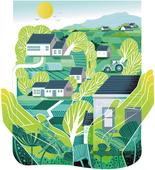Country's top leadership has adopted a slew of measures to ensure targets will not be compromised
 (SHI YU / CHINA DAILY)
(SHI YU / CHINA DAILY)
The central government has launched a national survey on the progress of poverty alleviation as the country drives to meet its goal of lifting its entire rural population out of poverty this year, with analysts saying the survey could help usher in more targeted aid measures for impoverished individuals.
The General Office of the State Council mapped out the survey, the first of its kind, in a notice published on June 29.
The survey is a key part of the groundwork for the country's targeted poverty reduction campaign as well as a comprehensive test of its outcomes, the office said.
China has lifted over 93 million people out of absolute poverty over the past seven years but still had 5.51 million rural residents living below the official poverty line by the end of last year.
However, the poverty alleviation campaign has been complicated by the COVID-19 pandemic. As the country's economy contracted for the first time in decades, many impoverished rural households faced difficulties finding jobs in urban areas, while sales of agricultural products also slumped.
The country's top leadership has adopted a slew of measures to ensure its targets will not be compromised, with the government already committed to spending 146.1 billion yuan (US$20.7 billion) on poverty alleviation this year.
A number of programs have been rolled out to facilitate the sale of agricultural products and bolster workshops that help poor households.
The survey will enable authorities to learn about the poverty alleviation situation as it relates to poor people and provide accurate information for judging and summarizing the outcomes of the campaign, the government notice said.
It will cover 832 counties that were focal points for the campaign, in addition to some other counties in the country's central and western regions.
Workers conducting the survey will prioritize efforts to find out basic information about poor households, such as their main source of income and whether their demands for food, clothing, compulsory education, basic healthcare and housing security have been met.
They are also expected to record how poor households are obtaining aid from authorities, taking part in poverty alleviation programs and the basic public services being offered at village and county levels.
Vice-Premier Hu Chunhua, who is also head of the State Council Leading Group on Poverty Alleviation and Development, told a meeting on June 30 that the quality of survey must be the top priority, and authorities must resolutely guard against human intervention and fraud.
The key is to ensure that the survey meets the same standards across the board and its data are truthful and accurate, he said.
The State Council started preparatory work for the survey in October, when it formed a leading group for the survey that is also headed by Hu. The group's office was set up in the National Bureau of Statistics.
Tang Lixia, a professor who studies poverty and rural development at China Agricultural University, said the COVID-19 pandemic and the floods in South China have posed severe challenges to the country's economic growth, with impoverished groups the most vulnerable.
"A survey of this kind will enable authorities to find out cases of people falling below the poverty line once again and problems such as a possible lack of momentum in poverty reduction campaigns," she said.
Tang added that the survey could help authorities better understand challenges and problems, and thus come up with more targeted measures to help the poor.
It could also help summarize practices that have proved effective, so they can be transformed into long-term measures, she said.
With the COVID-19 pandemic also posing threats to poverty reduction efforts worldwide, especially in some developing countries, Tang said the survey will offer confidence and impetus to the international community by summing up China's achievements and experience.
She said the survey should not be seen as a work assessment for authorities or the basis for official inquiries as the government had already established several work mechanisms for performance assessment and evaluation in the poverty alleviation area.


